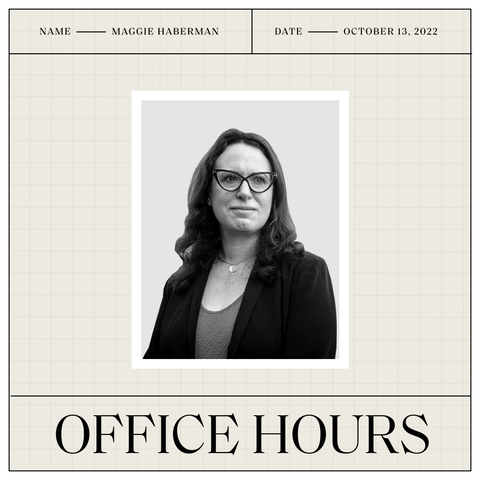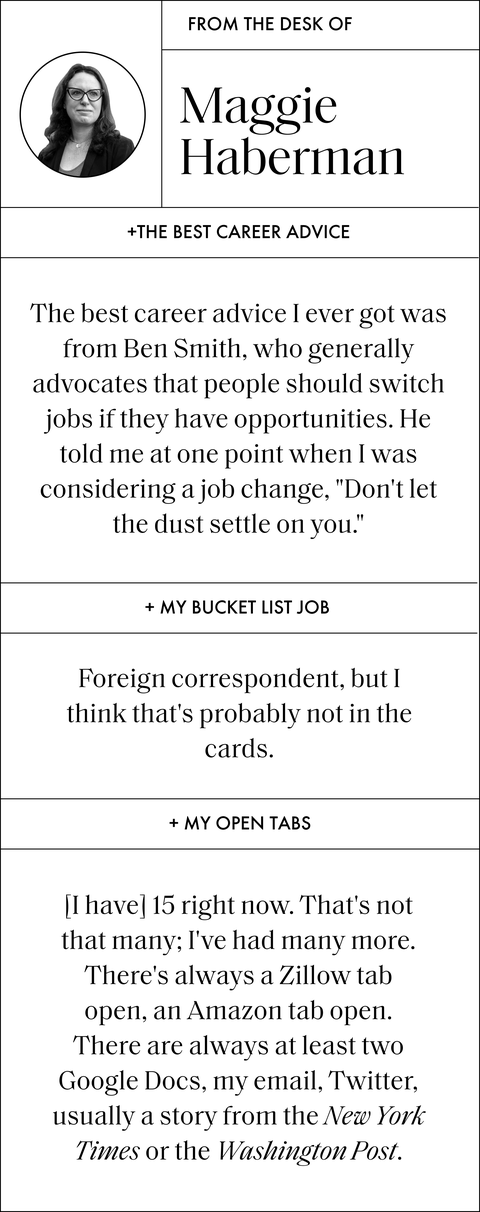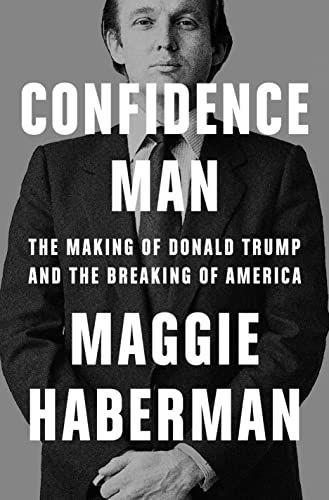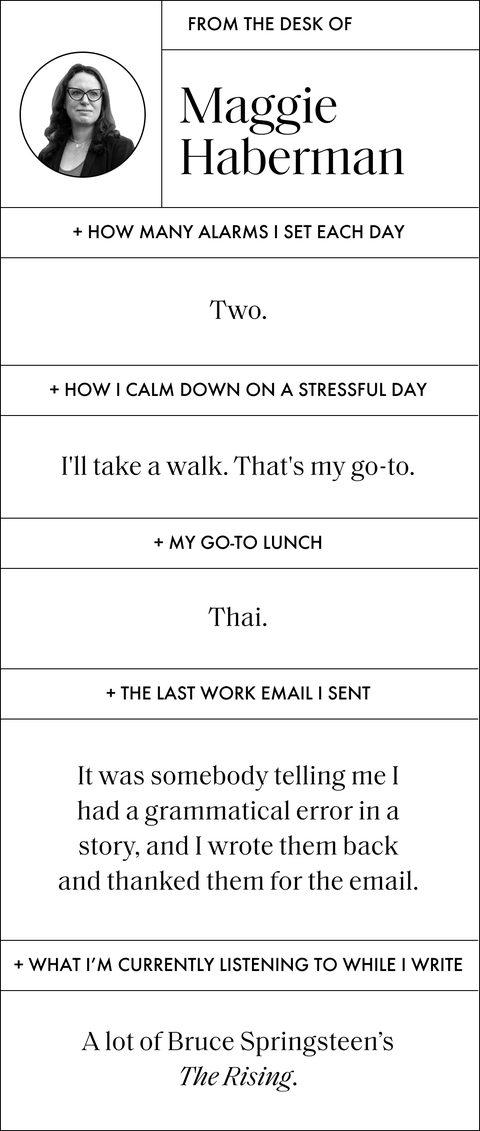Maggie Haberman on Why She Still Covers Donald Trump, Challenging the Powerful, and the Beat That Didn’t ‘Fit’
In ELLE.com’s monthly series Office Hours, we ask people in powerful positions to take us through their first jobs, worst jobs, and everything in between. This month we spoke with Maggie Haberman, the Pulitzer Prize-winning journalist who dominated coverage about Donald Trump’s presidency, becoming the leading reporter in the nation’s most competitive beat. Haberman first started her career at the New York Post (where her parents also met) and the New York Daily News before heading to Politico in 2010 and The New York Times in 2015, where she still works today. In 2016 alone, Haberman clocked 599 bylines, and during Trump’s presidency, she became the most read reporter at the Times—and one of Trump’s constant targets. Now, Haberman has published a 508-page account of Trump’s rise, titled Confidence Man: The Making of Donald Trump and the Breaking of America, featuring three interviews with the man himself. “I found writing a book to be very intense and very different than anything I’ve done before,” Haberman says. “You’re taking a longer view. You’re thinking about: Does information add to the narrative? Does it add to the portrait that you’re painting?” Below, the best-selling author shares how she views Trump after researching Confidence Man, plus the proudest—and the hardest—moments of her career so far.
My first jobs
My first babysitting job, I think I was 13, and it was for the child of a friend of one of my parents. It was where I learned the lesson about needing to keep an eye on a changing table; you can’t step away if a baby’s on one. I suppose I carry that with me in various forms. [laughs] I started waitressing when I was 19 or 20, and I became a bartender after that. A lot of it, especially bartending, was useful in the context of reporting in that you really are just engaging with people and talking to them. The flip side is you learn not to take aggression or attitude that’s inappropriate. Both of those became lessons that were useful as a reporter.
How I approach my relationship with sources
I came up as a reporter in tabloids in New York City, which were incredibly competitive. The tabloid war between the New York Daily News and the New York Post in the 1990s—I joined the New York Post in 1996 as a clerk—was one of the all-time great newspaper wars in the country. I had editors, at the New York Post especially, who drummed in my head: Don’t get beat. I remember there was a specific story in the 2000 Senate race where one of my colleagues was on the phone screaming with one of the Senate campaigns, “You f-ed us, you f-ed us,” over and over again. And without getting into specific language, I have made my displeasure with getting beat on a story known to people sometimes.
The way I know it’s time to cover something new
The beat that I really struggled on was the Brooklyn federal courthouse in 2000. I have enormous respect for people who can cover an institution like the Justice Department or a federal prosecutor’s office. They’re really difficult places to cover because they’re so opaque. For me, it was a difficult rhythm, and it was a very difficult time in the city. It was a year after Amadou Diallo had been killed by police officers. It was during the second trial related to police officers who had assaulted a Haitian immigrant named Abner Louima. It was the one beat that I really struggled on, and I knew it was time when I couldn’t see a path forward. I just was not good at it and it wasn’t a good fit. In general, I have stayed on beats until they play themselves out. I go with the story until the story is done, which is probably part of why I’m still covering Trump, because the story is not done.
How I view Trump after writing Confidence Man
I was really struck by going back and seeing how, brick by brick, he created this artifice about himself. Trump really used the media, story by story, starting in the ’70s and ’80s, to build this artifice of himself as this massively successful businessman on a scale that he just wasn’t. He had some successes; it wasn’t all a mirage. But it was never on the scale he described it as, and he was often undergirded by help from his father or more support from banks than he let on. And I’m trying to show people how he did that.
What I hope people take away from my book
I hope they have a better understanding of the world [Trump] comes from, his own personal, specific behaviors, and how it really shaped the presidency, and in a lot of ways foretold the presidency. One of the things I was really struck by as I would go back and do more reporting is just how much I was able to learn in the course of the last year, new pieces of information that I don’t know if they would’ve come out if I hadn’t had this opportunity to go back. I’m hoping people certainly take that from it, but I am hoping that they have a better sense of how we got here and why we got here, historically and more recently.
How I became comfortable challenging people in power
My main mentor was a man named Jack Newfield, who was a famous muckraking liberal journalist at the Village Voice in New York. He grew up poor and was furious at the systems that kept poor people poor, and that informed a lot of his coverage decisions. I worked with Jack when I was at the New York Post on a list of the 10 worst judges in New York. These were local court judges, and one district attorney found out that we were putting a certain judge in Manhattan on the list and called Jack and said, “You will lose all access to this office if you do this.” I had never experienced something like that before, and it was uncomfortable. I asked him, “What do we do?” and he said, “We keep it on. You can’t give in to that kind of intimidation.” That informed my thinking. So much of people in office is them attempting to intimidate reporters in one way or another, whether it’s that you’re not going to get your questions answered to something darker. Jack really helped shape my understanding of how to handle that.
The proudest moments of my career so far
I’m obviously proud of the Trump coverage overall for the last six years. I was proud of our reporting about what was in [former national security advisor] John Bolton’s book in 2020 during the impeachment trial. I think we did everything we could to let the public know what existed at a time when Republicans were trying to keep there from being witnesses and Bolton was not complying with a House subpoena. But one of the proudest moments of my career was in, I think, ’06. I found out that a former deputy mayor named Rudy Washington who had worked for [former New York City Mayor Rudy] Giuliani and who had been down at Ground Zero repeatedly was suffering from a 9/11-related illness and that the city, under [former Mayor Mike] Bloomberg, had cut off his benefits. He was not happy that I was writing about it, and it’s uncomfortable; I don’t want to write about somebody’s health when they’re uncomfortable about it. But on the other hand, there was a public issue here. I wrote about it, and his benefits were restored. I was very happy with it.
My advice I’d give young journalists
Be on Twitter less, be on social media less. At minimum, you end up saying a lot of things you might wish you hadn’t said later that seemed fine in the moment. Try not to get discouraged. The opportunities are really different than when I first started. The worst part about the media landscape right now, honestly, is the death of local journalism. That impacts younger reporters, frankly, as much as it does the communities that aren’t getting covered. But don’t get discouraged. You will figure out if this is right for you or not. It is not for everybody. There are a lot of people who start out in journalism and leave, but give yourself some time to see.
The qualities I see in reporters who have long careers
There’s a willingness to be wrong. That’s the most important. That doesn’t mean an eagerness to show you’re wrong, but a willingness to acknowledge if you get something wrong—to not just fix it but to learn something new. A willingness to think through a story before moving forward. And a curiosity, even when things seem at their bleakest.
This interview has been edited and condensed for clarity.
Madison is a senior writer/editor at ELLE.com, covering news, politics, and culture. When she’s not on the internet, you can most likely find her taking a nap or eating banana bread.





